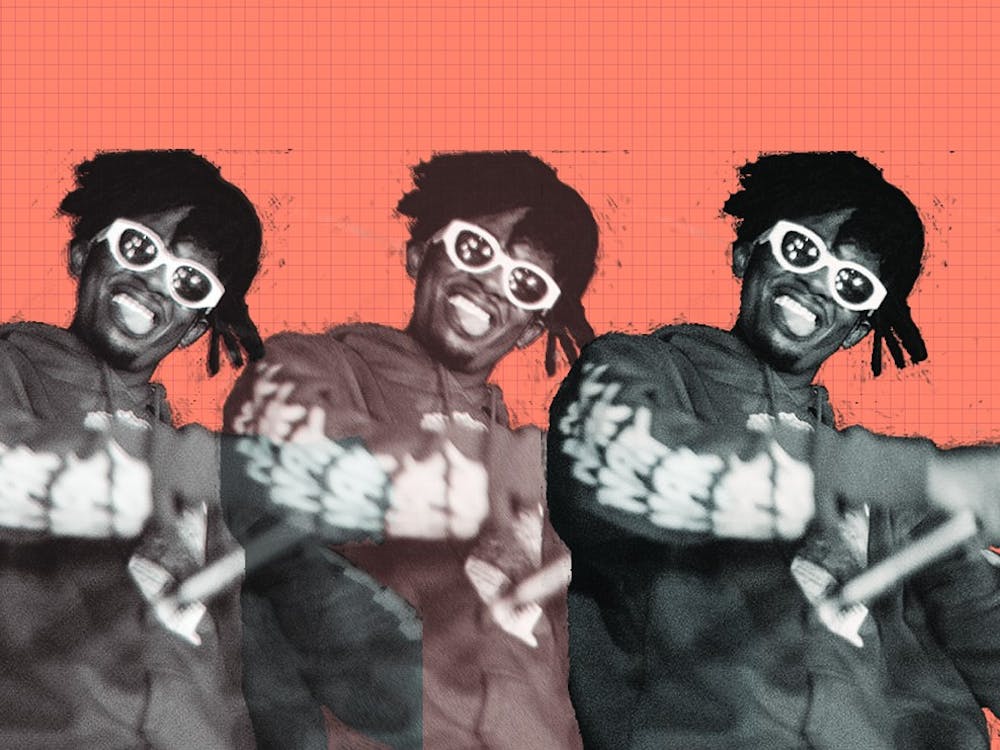As he lounges in his throne room atop Mount Olympus, being fed molly-coated grapes by someone he pays to have the exact voice and mannerisms of Alfred Pennyworth, Jordan Carter — the figurehead of Playboi Carti — reflects.
By 2015, The gears of hip hop could no longer support the dragging weight of pure rap. The forest was overdue for a cleansing fire. Just then, SoundCloud exploded. Carti racked up a few hits, “Broke Boi” and “Fetti,” as well as numerous guest spots with budding stars such as Kodak Black.
His fashion bravado coupled with his musical successes attracted Rocky and the A$AP Mob, stylistic supremacists. On “Telephone Calls” from their first “Cozy Tapes” album, Carti burst into the light with a five-bar verse in which only 21 unique words were used. He showed little promise, and those who had not hopped onto his wave initially viewed him with disdain.
But in February 2017, a prodigious twist of fate occurred when Carter connected with fledgling producer Pi’erre Bourne. When the two combined, they made Playboi Carti something else. He was no longer a man, which is why is Carter the figurehead, not the person. Carti was then and is now a concept, a band of synchronous insanity. It rips apart what rap music was, and shows us what it can be once we forsake lyricism and fry our brains in the fire.
This collaboration of two underground diamonds forged, in a matter of two months, much of the self-titled Playboi Carti mixtape. The fanbase had expected a continuation of the grimy squeaking which gained him relative fame, and no self-respecting rap fans anticipated anything more than another character-focused, bass-boosted party album.
But “Playboi Carti” was good. It was really good. The beats were marvelous, high-strung pockets of chaos perfectly suited for Carter’s mania. He says nothing of any lyrical merit, but the listener finds themselves forgetting that should matter. It is a strange, beautiful dance between sounds and music that makes Playboi Carti so unique.
A year later, after the mystique of Playboi Carti had grown, then waned, then been nearly forgotten, his opus, “Die Lit,” was released. Whereas the “Playboi Carti” mixtape had introduced a hedonistic yet safe character, “Die Lit” killed him and transferred his consciousness into a dizzying hurricane of ad-libs and quips traversing some of the most gratifying beats ever made. Bourne handled only six songs on “Playboi Carti,” but on “Die Lit,” he orchestrated 14.
Pi’erre Bourne is on another plane of existence with the production of this album. His beats are LSD-swamp-themed: There are monsters behind every corner, wicked trees and gurgling holes in the muck, but all of it is heard through a filter of pure rainbow joy. The gurgling becomes bouncing, thunderous 808s; the howling of the wind through the trees becomes glittering Japanese folk samples. The beats have a candy coating and a candy filling. They are decorated with sugar and laced with crack.
Carter deserves his fair share of the credit. He conducts the album as no one else on Earth could. Whereas rappers concerned with any sort of lyricism would have been struck dumb by the otherworldly beats of Bourne (which sound like they were made in 2035 and sent back through a wormhole), Carter grounds them to a pulp and makes each one his home. He never lets them drift fully into the abstract or absurd, inserting his sounds and mumbles everywhere he possibly can.
The critics were punched in the face, and the fanbase swelled. Their blind devotion — obsession, even — illuminates the true majesty of Playboi Carti. Famed historian Henry Adams famously stated, “By nature, man is lazy, working only under compulsion.” Famed historian Henry Adams clearly has never met a 14-year-old Carti Stan. His adolescent legion rivals Soviet propaganda posters in its work ethic.
These young fans went to concerts, recorded the unreleased music he played at the end of sets, isolated the vocals through meticulous and slow editing, and recreated the beats on pirated copies of FL Studio or Logic Pro. They learned to code to leak his music, and found channels and Instagram accounts through which to distribute it. Carti never had to spend a dime on marketing; kids would do it for him, for free.
He claims not to be involved in the leaks, but if he really wanted to stop the bleeding, he could invest in any sort of cybersecurity that cannot be circumvented by literal children. The leaks build his allure, and by leaking his throwaways, he creates a complex system of clout distribution based on how many Carti leaks one has heard. Some of the leaks could be certified diamond records, such as “Pissy Pamper,” which introduced the world to the wonders of his baby voice.
Playboi Carti embodies everything that makes the SoundCloud rap era beautiful. His music is low-effort, and his success was built by a community of thousands from all over the world. He has to have the highest wealth-to-effort ratio of any human being on earth. But through his passiveness, he has allowed his team and his army of Stans to change how music sounds, how much depth it needs and how it is distributed. He is constantly changing to keep his appeal fresh, and SoundCloud changes around him.
Get The Chronicle straight to your inbox
Signup for our weekly newsletter. Cancel at any time.

